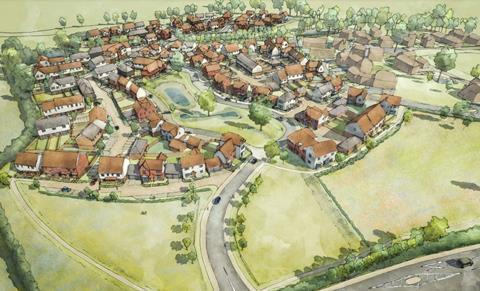
Industry bodies believe housing delivery numbers will drop after the housing minister last week blocked a 165-home Berkeley Homes’ scheme in Kent.
Industry figures fear the decision to refuse the development was politically motivated and are concerned there will be more such government interventions.
The concerns follow housing minister Rachael MacLean’s decision to refuse permission for a 165-home Berkeley Homes scheme in Kent last week on design grounds, against the advice of a planning inspector .
Rico Wojtulewicz, head of housing and planning policy at the National Federation of Builders, described the decision as “political expediency”. He pointed out the government had not said how the scheme could be better designed, although the housing secretary rejected it for not being of a “high [enough] standard” to be built in an area of outstanding natural beauty (AONB).
“We don’t believe this is about getting better designed housing but about signalling to the voters that the government doesn’t want to build.” He suggested building on brownfield first was an “incoherent policy”.
Another senior housebuilding industry figure said: ”The local authority was actually in favour of this development but it seems like the decision has been taken with electoral politics in mind. They’re protecting their parliamentary majorities.”
Brian Berry, chief executive of the Federation of Master Builders, said he took the government’s reason for refusing the development at face value. “New developments need to be well designed,” he said. However, he added: “It’s not a good sign that a proposed housing development in Kent is being cancelled at a time when the country is facing a severe housing shortage.”
He suggested: “If the government is truly intent on delivering well designed, quality homes it must make it easier for a wider range of housing developers to enter the market.” He pointed out that SME builders were only building around 10% of homes in England and Wales now. Housing Today highlighted the issues for SME builders last year.

David O’Leary, executive director of policy at the Home Builders Federation said: “The housing secretary is personally intervening to block developments that local communities actually want to see go ahead. Regardless of the supposed aims the outcome seems to always be the same: fewer new homes built. This may be clever politics but the long-term social and economic consequences will be huge.”
The news comes after housing secretary Michael Gove caved in to backbench pressure in December, and agreed to scrap mandatory local housing targets and push for greater development on brownfield land.
Berkeley Homes’ 165-home Crane Valley, near Tunbridge Wells, had been originally given the go ahead by a planning inspector following a public inquiry in September 2021.
The inspector said the scheme would deliver a “package of exceptional benefits” including 40% affordable housing, landscape enhancements with limited associated harm, and biodiversity enhancements.
The properties in the scheme would have been a mix of one and two bedroom apartments, and houses ranging from two to five bedrooms, in mainly two storey buildings. A range of terraced, semi-detached and detached forms were proposed.
The decision was technically made by housing minister Rachel McLean on behalf of Gove. The decision letter said: “It said: “While he [the secretary of state] agrees with the inspector that the proposed development would deliver landscape enhancements he does not find the proposal to be of a high standard which has evolved through thoughtful regard to its context.
“Overall, he does not find that the scheme is sensitively designed having regard to its setting. He finds that the design of the proposal does not reflect the expectations of the High Weald Housing Design Guide, being of a generic suburban nature which does not reproduce the constituent elements of local settlements. He also considers that the layout of the scheme does not respond to its AONB setting”
The local authority’s housing shortfall was “very slight”, the letter added, with the council’s supply of housing land amounting to 4.89 years.



